Healthy Skin Reflects How Healthy You Are on the Inside
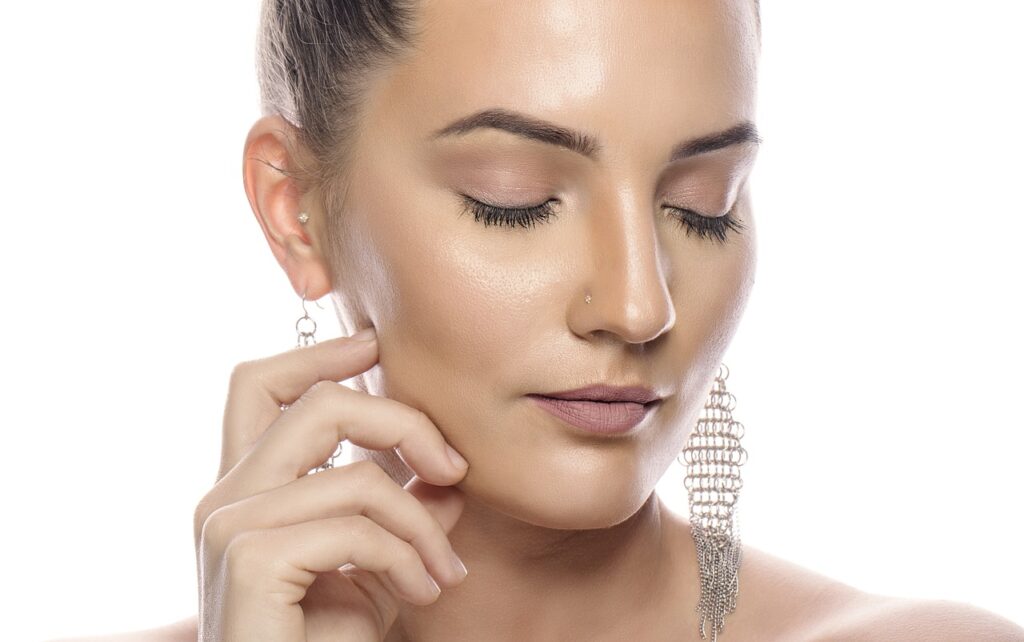
If you want glowing skin, the old adage ‘you are what you eat’ has never been truer as a healthy skin reflects how healthy you are on the inside. Beautiful glowing skin starts with nourishment from within. Older cells are constantly shed and replaced by younger ones and a steady supply of key nutrients is essential to support this rapid growth. Eating the correct balance of foods will feed your skin the vital nutrients it needs to help it stay soft, supple and blemish free.
Whatever we try to do our skin ages naturally. As we get older wrinkles and age spots are inevitable, but skin aging may be accelerated by overexposure to the sun and UV light, strong soaps, chemicals and poor nutrition. With this in mind, a holistic approach is best. Treat your skin kindly and optimise your nutrition by eating antioxidant-rich fruit and vegetables, healthy fats from oily fish and nuts, and a varied and balanced diet. This should give optimal levels of the nutrients which are vital for radiant skin, including beta carotene, vitamins A, C and E, zinc and selenium.
Foods for Healthy Skin
Research increasingly shows that what you eat can significantly affect the health and aging of your skin. The following are some of the best foods for keeping your skin healthy:
1. Omega 3 Fatty Acids
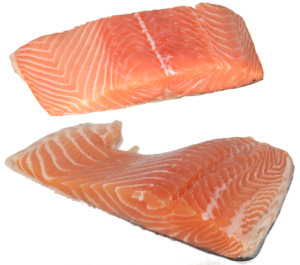
Omega 3 fats are essential fatty acids. This means that they cannot be made in the body and so must be obtained from the diet. Foods rich in omega 3 fatty acids have many health benefits including lowering triglycerides and reducing inflammation. They can also benefit the skin as they help preserve collagen keeping it firm, supple and moisturised. Omega 3s also retain the skin’s natural oil barrier, combatting dryness, dullness and uneven complexions.
In addition, Omega 3s encourage the body to produce anti-inflammatory compounds which help relieve inflammatory skin conditions such as acne, eczema and psoriasis. In fact, an omega 3 deficiency can cause dry skin. Studies have also shown that they can make the skin less sensitive to the sun’s UV rays.
The best source of omega 3s is oily fish. It is also be found in lower quantities in plant sources such as linseed, chia seeds, walnuts and rapeseed oil. In cases where fish cannot be eaten, fish oil supplements are also effective in maintaining healthy skin.
The fish with the highest omega 3 content include salmon, sardines, herring and mackerel.
Salmon
Salmon is rich in antioxidants which reduce inflammation and can affect the skin’s appearance. The omega 3 reinforces the skin’s barrier keeping moisture in and irritants out. Wild salmon should be preferred over farm-raised salmon as it contains higher levels of omega 3s.
Mackerel
Mackerel is one of the best sources of vitamin B12, containing 270% of the body’s daily requirement. This is important as many people do not consume enough vitamin B12 when they trying to eat less meat or are vegetarians. Vitamin B12 deficiency can result in hyperpigmentation (dark spots) and vitiligo (white spots), and so it is important to consume sufficient quantities.
Sardines
Sardines contain high levels of omega 3 fatty acids making it a great fish for reducing inflammation, redness and acne. Omega 3s also have mood regulating effects which can help with the stress aspect of having acne. Acne sufferers should consume 4 to 5 servings of oily fish per week in order to treat the condition. Sardines are also a good source of calcium because the bones are so tiny and soft that they are edible.
As well as omega 3 fatty acids, oily fish is also a good source of other nutrients including:
- Vitamin E. This one of the most important antioxidants for the skin as it protects the skin from inflammation and harmful free radicals.
- Protein. Oily fish contains high quality protein which is necessary for maintaining the strength of the skin.
- Zinc. Fish contains high levels of zinc which affects inflammation, overall skin health and the production of new skin cells. Zinc deficiency can lead to skin inflammation, blemishes and delayed wound healing.
2. Avocados
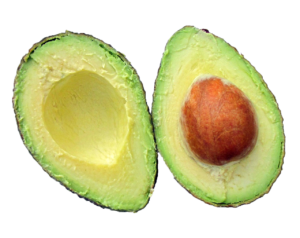
The healthy mono-unsaturated and polyunsaturated fats which are found in avocados are essential fatty acids which act as a natural moisturiser for the skin. This keeps the skin supple, flexible, firm and improves its elasticity. In fact, according to a study which involved over 700 women, a high intake of the healthy fats found in avocados is associated with more supple and firm skin.
Avocados are rich in antioxidants such as beta carotene, lutein and zeaxanthin, which help to protect the skin from damage from the sun’s rays. This is because ultraviolet light can damage the skin leading to wrinkles and other signs of aging.
Avocados are also a good source of vitamin C and E which are important antioxidants. These help protect the skin from oxidative damage from the sun and environment which can lead to wrinkles and other signs of aging.
Vitamin C is required for the formation of collagen, which is the main structural protein. It helps improve the skin’s elasticity, prevent sagging and ultimately keep the skin plump and youthful. In fact, vitamin C deficiency may lead to dry, rough, and scaly skin.
Avocados can also be applied topically to help soften and hydrate the skin. A moisturising face mask consisting of mashed avocado, honey and lemon can easily be applied.
3. Walnuts
Walnuts are excellent for skin health as they stimulate collagen production due to their high levels of omega 3 fatty acids. Omega 3s also have an anti-inflammatory effect thus reducing skin redness and inflammation. Walnuts also contain an omega 3 called alpha-linolenic acid. Deficiency of this fat can cause eczema which is associated with dry scaly skin.
Walnuts also contain high levels of zinc which is necessary for healthy skin, improved wound healing and reduced inflammation. In addition to zinc, walnuts also contain vitamin E and selenium which are powerful anti-oxidants.
4. Sunflower seeds
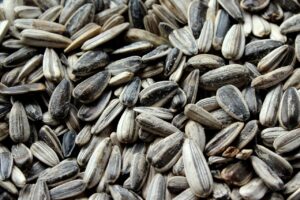
Sunflower seeds are excellent for healthy skin as they contain high levels of natural fats, vitamin E, selenium and zinc. They prevent premature aging because the high selenium content helps to repair damaged cells. In addition, the high vitamin E content is important for the production of collagen and elastin. These keep the skin taut and firm by preventing the appearance of fine lines and wrinkles and so helps maintain a youthful glow.
Sunflower seeds contain high levels of fat-soluble antioxidants such as vitamin E, beta-carotene and polyphenols as well as zinc. These help prevent oxidative damage from the sun and other environmental irritants, thus preventing premature skin aging, and improve the skin’s barrier function. They are therefore very important for preventing inflammation, redness and sensitivity that is usually associated with acne-prone skin. The magnesium content in these seeds helps regulate hormonal imbalance and thus prevents excess sebum production thereby reducing the occurrence of acne.
Sunflower oil, which is obtained from sunflower seeds, is also a rich source of natural fats which help repair dry, damaged and dehydrated skin from within. It acts as a natural emollient which gives the skin a soft, supple and nourished appearance. This oil is also excellent for people with sensitive skin as it calms and soothes inflamed skin.
5. Sweet Potatoes
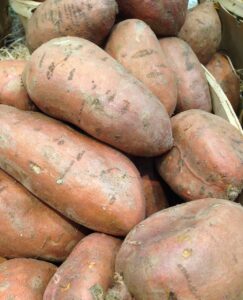
Sweet potatoes help to give the skin a healthy natural glow whilst making the skin softer and younger looking. They contain high levels of the carotenoid beta-carotene which gives the skin a warm natural glow. This powerful antioxidant is converted in the body in to vitamin A which neutralizes free radicals and prevents premature skin aging. Beta-carotene acts as a natural sunblock because when it is consumed it is incorporated into the skin which helps protect the skin cells from sun exposure. This may help to prevent sunburn, cell death and dry, wrinkled skin.
Sweet potatoes are also rich in vitamin C and E, both of which are very important for keeping the skin healthy, glowing and supple. Vitamin C helps boost collagen production which tightens the skin. Sweet potatoes are also a rich source of anthocyanins which help to prevent blemishes and dark spots by neutralising harmful free radicals.
6. Red and Yellow Bell Peppers

Bell peppers are excellent sources of vitamin A and C. In fact, one red pepper contains 3 times more vitamin C than an orange. Vitamin C is very important for skin health as it stimulates the formation of collagen which keeps the skin firm and strong. In fact, studies show that eating plenty of vitamin C leads to a reduced risk of wrinkled and dry skin with age.
Bell peppers also contain high levels of the powerful carotenoid antioxidants, such as beta-carotene, which is converted by the body in to vitamin A. Beta-carotene reduces the sensitivity of the skin to the sun thus reducing the appearance of fine lines around the eyes and crow’s feet
One study in the British Journal of Nutrition found that people who ate the most red and yellow vegetables (up to 250 grams; one large pepper averages 190g) had fewer wrinkles, especially in the crow’s feet area, compared to those who ate the least amount (69g daily). This may be due to the neutralisation of free radicals by the antioxidants in the peppers.
7. Broccoli
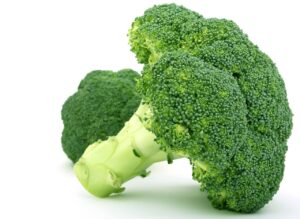
Broccoli is very beneficial for skin health as it contains several vitamins and minerals, such as vitamin A and C and zinc. It also contains the powerful carotenoid antioxidant lutein which protects the skin from oxidative damage.
Broccoli also contains the phytonutrient sulforaphane. This phytonutrient is very beneficial for skin health as studies have shown that it may help maintain collagen levels in the skin whilst also protecting against some types of skin cancers. Sulforaphane also protects the skin from sun damage as it neutralises the harmful free radicals whilst at the same time activating other protective systems in the body.
Laboratory tests show that sulforaphane reduces the number of skin cells which are killed by UV by as much as 29%, with protection lasting up to 48 hours.
8. Tomatoes
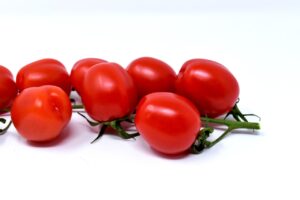
Tomatoes are packed with vitamins and minerals, including Vitamin A, K, B1, B3, B5, B6, B7, and vitamin C. What makes tomatoes stand out is that they contain all of the major carotenoids. The powerful antioxidant carotenoids found in tomatoes include beta-carotene, lutein and especially lycopene which have been found to protect the skin from sun damage and prevent wrinkles. Tomatoes are therefore excellent for maintaining healthy skin. As carotenoids are fat soluble, their absorption is increased when tomatoes are consumed with fat, such as olive oil or cheese.
A 2008 study in the British Journal of Dermatology found that people who ate five tablespoons of tomato paste daily, together with a tablespoon of olive oil, for 12 weeks had 33% more protection against sunburn than a control group. This is because tomatoes contain high levels of lycopene which is a pigment naturally found in skin and has amazing anti-aging properties. While it won’t replace sunscreen, this antioxidant can offer long-term protection against UV radiation and neutralise harmful free radicals.
Tomatoes are slightly acidic in nature and so when tomato pulp or juice is applied topically to the skin it tightens the pores and prevents pimples.
9. Soy
Phytoestrogens are natural chemicals found in plants which have a similar structure to the female sex hormone oestrogen. They have been found to benefit several parts of the body, including the skin, as they help to keep the natural hormones balanced. There are different types of phytoestrogens; isoflavones are found in soya bean products such as tofu, whereas the lignan polyphenols are found in the fibre of wholegrains, fruits, vegetables and linseed.
A 2017 study involving middle-aged Japanese women found that those who consumed 40mg of aglycone (an isoflavone found in soy) daily for 12 weeks had fewer fine wrinkles and improved skin elasticity when compared to a placebo group. These isoflavones can help stop the breakdown of collagen which is what leads to sagging skin and wrinkles. These effects are expected to be more pronounced in postmenopausal women as after the menopause the oestrogen level in the body begins to decrease.
10. Dark chocolate
Dark chocolate with a high cacao content (at least 70%) is very beneficial for skin health. Cacao is rich in powerful polyphenol antioxidants called flavanols. These may firm and hydrate the skin, protect it from UV damage and improve circulation for a healthy glow.
Several studies have shown that women who consumed a cocoa powder drink high in flavanols daily for 12 weeks experienced less skin roughness and scaliness compared to a control group. It was found that the skin had a better texture, was smoother, thicker and more hydrated, less sensitive to sunburn and had better blood flow which results in more nutrients being brought to the skin.
Make sure to choose dark chocolate with at least 70% cocoa to maximize the benefits and keep added sugar to a minimum.
To reap the natural health benefits of dark chocolate, avoid milk chocolate which contains lots of sugar and dairy. Also, stick to 1oz portions (150 calories) of dark chocolate containing at least 70% cacao to maximize its health benefits. Look for high cacao concentrations because these have less sugar which can be very bad for your skin,
11. Green tea
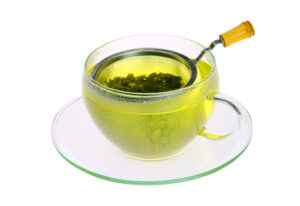
Green tea contains powerful polyphenol antioxidants known as catechins which are very beneficial for skin health.
A 2011 study published in the Journal of Nutrition found that people who drank green tea daily for 12 weeks had skin which was smoother, more elastic, and had less sun damage when exposed to UV light when compared to a control group. It was found that green tea contains the powerful catechin epigallocatechin gallate (EGCG) which boosts the blood flow to the skin. Increased blood flow ensures that the skin cells receive fresh oxygen and nutrients which help to maintain their health and maintain a healthy complexion.
Green tea is also a good source of lutein and zeaxanthin. These antioxidants absorb and neutralise the free radicals created by UV light, and other environmental factors, thus protecting the skin from sun damage. In fact, a 12 week study found that drinking green tea daily could reduce redness from sun exposure by up to 25%.
Milk should not be added to green tea as it may reduce the effect of the antioxidants found in it. The vitamin K in green tea helps to lighten dark circles under the eyes. In fact, used green tea bags can be put in the fridge and then used as a 15 minute under eye treatment.
12. Grapes
Red and black grapes contain a combination of ellagic acid and resveratrol. These are powerful antioxidants which help combat oxidative stress and thus reduce skin aging, while helping to maintain skin cell regeneration. Studies have shown that they may help prevent the formation of harmful free radicals which damage skin cells and cause signs of aging.
Resveratrol is also found in red wine. There is not sufficient evidence to suggest that adequate amounts, that can affect the ski, can be obtained from a glass of red wine.
13. Watermelon
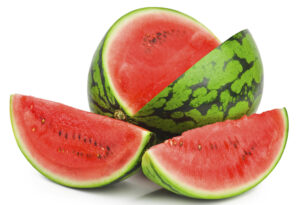
Two cups of cubed watermelon are equal to a full cup of water and can help you (and so therefore your skin cells) remain hydrated. The large amount of water in watermelon can actually reduce the water retention that leads to puffiness around the eyes. In addition, as watermelon is low in sugar compared to many other fruit, there is no need to worry about glycation, the chemical reaction that compromises collagen and leads to lines and wrinkles.
Furthermore, the high levels of antioxidants such as betacarotene and vitamin C found in watermelon further help to protect the skin from free radicals.
14. Carrots
Carrots are orange due to their high betacarotene content. This is a powerful antioxidant which is converted into Vitamin A by the body. The high betacarotene content therefore makes carrots a powerhouse for glowing skin as it helps prevent the degeneration of cells, slows aging and makes the skin glow. In fact, a 2011 study in the UK found that people who ate a higher amount of carotenoid-containing fruits and vegetables, such as carrots, had more yellow tones in their skin giving them a complexion that others rated as looking healthier.
The vitamin A found in carrots also helps to keep body tissue, eyes, bones and teeth healthy. Carrots also have a high vitamin C content which promotes collagen growth and reduces acne and dark spots.
15. Olives and olive oil
The antioxidant polyphenolic compounds found in olives (and olive oil) may help to protect cells and improve blood flow throughout the body. Olive oil may be the one of the healthiest oils but it is also one of the best for healthy skin. Approximately 75 percent of the fat in olive oil is monounsaturated fatty acids, which may play a role in its youthful benefits,
A 2012 study showed that a diet rich in olive oil reduces the effects of photo-aging on facial skin. It was found that a higher consumption of olive oil (more than 2 teaspoons a day) was associated with 31% fewer aging signs compared to people who ate less than 1 teaspoon. Olive oil was better than the other oils tested, including sunflower and peanut oil. This was attributed to the high monounsaturated fatty acid content, as well as to the antioxidant polyphenols and other compounds, which may protect against dryness and damage from free radicals.
16. Oranges

Research published in the American Journal of Clinical Nutrition shows that people who eat foods rich in vitamin C have fewer wrinkles and less age-related dry skin problems than those who do not. Other great source of vitamin C include strawberries, red peppers, and grapefruit.
Researchers from the University of Arizona looked at people who reported that they ate citrus fruits, juices and peels weekly. People who ate peels (orange peel or lemon zest, for example) had a 33% lower risk of developing squamous cell carcinoma. Juice and fruit did not have any effect. The researchers credited this to limonene, a compound found in the oil in the peels, which provides the UV protective benefits.
Orange peel actually contains more vitamin C than the orange itself. The peel has antimicrobial and antibacterial properties and so using it regularly in face packs will give you clear and brighter skin. An orange peel and yoghurt face pack can be used to instantly rejuvenate your skin. All that is required is 1 tablespoon of orange peel powder and 2 tablespoons of yoghurt. Alternatively, 1 tablespoon of sandalwood powder and 1 tablespoon of walnut powder can be added to 1 tablespoon of orange peel powder with a few drops of lemon juice and rose water to get brighter skin.
17. Leafy Greens
Leafy greens, such as kale and spinach, are packed with antioxidants which neutralise harmful free radicals. They contain vitamin A which works against dry, flaky skin; vitamin C, which reverses the sun’s damage to collagen and elastin; and vitamin E, which helps reduce inflammation. Furthermore, leafy greens contain folate, a nutrient necessary for DNA repair.
Just one cup of kale has twice the daily recommended intake of Vitamins A and C, both of which are essential for protecting against the oxidative, damaging effects of the sun and building glow-boosting collagen.
Studies have shown that kale is also packed with the antioxidant carotenoids lutein and zeaxanthin. These neutralise and soak up the wavelengths of UV light which sunscreens do not. They are vital for protecting and hydrating the skin cells whilst preventing skin damage. Adding kale to your diet is easy: simply add handfuls to your morning smoothie, mix it into greens at lunchtime or steam on top of fish or chicken.
18. Almonds
Almonds are rich in unsaturated fatty acids, and are a good source of vitamin E. This is a powerful antioxidant that helps prevent signs of aging caused by free radicals, and may even boost the skin’s defence against skin cancer.
19. Eggs

The amino acids found in protein-rich foods such as meat or eggs are the building blocks of collagen production. Eggs also contain the antioxidant lutein which helps keep the skin hydrated and firm, and also promotes the natural oils that help keep the skin looking radiant.
Eggs have a high protein content without lots of fat which is beneficial for the skin: High fat diets are linked to aging skin. In fact, according to a study in the American Journal of Clinical Nutrition, a 17g increase in fat intake increases the risk of developing wrinkles by 28%.
20. Brazil Nuts
Selenium, found in Brazil nuts, is a very powerful antioxidant that helps protect the skin from free radicals. Studies have shown that selenium can help to clear skin and reduce the risk of acne.
21. Berries
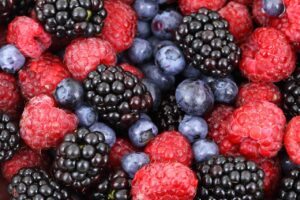
Berries, including blueberries, blackberries, strawberries, cranberries, raspberries and goji berries, are packed with nutrients and antioxidants which do wonders for the skin.
Anthocyanin, the pigment responsible for the red, blue, and purple colours found in these berries, is a powerful antioxidant which protects the skin from free radical damage. These antioxidants have an anti-inflammatory effect which helps the body to heal itself whilst also protecting against further free-radical damage
Berries are also rich in vitamin C and flavonoids which help to maintain and promote skin health. This is because they boost collagen production and reduce fine lines and wrinkles.
Just half a cup of berries a day can help prevent premature aging and wrinkles.
22. Water
Drinking plenty of water may be the easiest and quickest way to maintain skin health. This is because staying hydrated can help the skin cells absorb nutrients and release toxins.
Skin needs moisture to stay flexible. Even mild dehydration can cause the skin to look dry, tired and slightly grey. Drink at least 6 to 8 glasses of water daily. All fluids count towards your daily amount but water is the best. Remember that some fruit and vegetables, such as watermelon and cucumber, also contribute fluids that help to hydrate your body and skin.
Avoid smoking and excessive alcohol consumption as both can age the skin.
23. Oats
The high levels of the antioxidant selenium makes oats are a great skin food. It helps protect cells from environmental damage, thus ensuring a smooth radiant complexion. In addition, the prebiotics found in oats fuel the body’s beneficial probiotics thus bolstering the immune system overall.
24. Pecans
The ellagic acid found in many plant-based foods, such as nuts, has been linked to protecting skin cells from UV damage. Pecans also contain several antioxidants and minerals such as vitamins A and E, calcium and potassium. They also contain high levels of zinc which may help promote glowing skin and protect immunity.
25. Kiwi
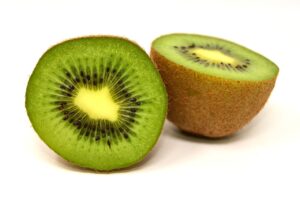
The kiwi contains very high levels of vitamin C. In fact, a medium kiwi contains over 120% of your daily needs! A study in the American Journal of Clinical Nutrition found that a diet high in vitamin C is associated with less dryness and less noticeable wrinkles. This is because vitamin C stimulates collagen production, which gives the skin its elasticity, keeps it taught and smoothes fine lines. Collagen breaks down as you age, which in turn causes wrinkle formation, but a vitamin C packed kiwi can help counteract this effect
26. Zinc-rich foods
Zinc has many effects on skin health, including:
- is involved in the normal functioning of the sebaceous glands in the skin (which produce oil)
- helps to repair skin damage,
- keeps the skin soft and supple
- helps protect skin cells from long-term damage.
Zinc-rich foods include fish, lean red meat, wholegrains, poultry, nuts, seeds and shellfish (including prawns, oysters, and mussels).
27. Mushrooms
Mushrooms contain selenium which is a powerful antioxidant which helps protect the skin from sun damage.
28. Mangoes
Mangoes are a great source of beta-carotene which is converted by the body in to vitamin A. It helps the skin repair itself, stay smooth and even delay the appearance of wrinkles. In addition, it helps to protect the cells and helps them regenerate.
29. Turmeric
Turmeric has powerful anti-inflammatory properties and has been shown to boost the immune system and support proper brain function. Consume it with warm water to balance your skin’s natural flora and protect your skin cells from free radicals.
30. Pumpkin
Pumpkins contain high levels of antioxidants, vitamins (A & C) and minerals (such as zinc). Eating a handful of pumpkin seeds daily can brighten your complexion and improve your skins glow
General Nutrition Guidelines for Healthy Skin
A healthy balanced diet is essential as a foundation for good general health. There are many foods which are beneficial for skin health but consistently eating healthily can help you achieve that healthy radiant look. General nutrition guidelines for achieving and maintaining healthy skin include:
- Drink six to eight glasses of water a day to keep the skin hydrated
- Increase the intake of omega 3s from, for example, oily fish or nuts and seeds.
- Eat a minimum of five portions of fruit and vegetables every day. A selection of colourful fruits and vegetables is recommended.
- Eat sufficient vitamin C as it promotes radiant skin and helps blemishes heal properly. It is needed to produce collagen that strengthens the capillaries which supply the skin.
- Increase your intake of selenium. Studies suggest that a selenium-rich diet helps to protect the skin against skin cancer, sun damage and age spots.
- Eat enough vitamin E which protects the skin from oxidative damage and supports healthy skin growth.
- Eat plenty of zinc. Zinc is necessary for the normal functioning of the sebaceous glands in the skin, helps to repair skin damage and keeps the skin soft and supple.
